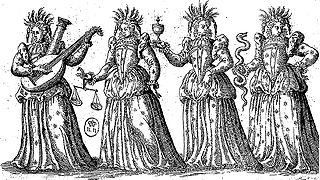This page lists some links to ancient philosophy, namely philosophical thought extending as far as early post-classical history.

A virtue is a trait of excellence, including traits that may be moral, social, or intellectual. The cultivation and refinement of virtue is held to be the "good of humanity" and thus is valued as an end purpose of life or a foundational principle of being. In human practical ethics, a virtue is a disposition to choose actions that succeed in showing high moral standards: doing what is said to be right and avoiding what is wrong in a given field of endeavour, even when doing so may be unnecessary from a utilitarian perspective. When someone takes pleasure in doing what is right, even when it is difficult or initially unpleasant, they can establish virtue as a habit. Such a person is said to be virtuous through having cultivated such a disposition. The opposite of virtue is vice, and the vicious person takes pleasure in habitual wrong-doing to their detriment.
Ancient Greek philosophy arose in the 6th century BC. Philosophy was used to make sense of the world using reason. It dealt with a wide variety of subjects, including astronomy, epistemology, mathematics, political philosophy, ethics, metaphysics, ontology, logic, biology, rhetoric and aesthetics. Greek philosophy continued throughout the Hellenistic period and later evolved into Roman philosophy.

In nuclear engineering, a neutron moderator is a medium that reduces the speed of fast neutrons, ideally without capturing any, leaving them as thermal neutrons with only minimal (thermal) kinetic energy. These thermal neutrons are immensely more susceptible than fast neutrons to propagate a nuclear chain reaction of uranium-235 or other fissile isotope by colliding with their atomic nucleus.
The Middle Way as well as "teaching the Dharma by the middle" are common Buddhist terms used to refer to two major aspects of the Dharma, that is, the teaching of the Buddha. The first phrasing refers to a spiritual practice that steers clear of both extreme asceticism and sensual indulgence. This spiritual path is defined as the Noble Eightfold Path that leads to awakening. The second formulation refers to how the Buddha's Dharma (Teaching) approaches ontological issues of existence and personal identity by avoiding eternalism and annihilationism.

The Doctrine of the Mean or Zhongyong is one of the Four Books of classical Chinese philosophy and a central doctrine of Confucianism. The text is attributed to Zisi, the only grandson of Confucius. It was originally a chapter in the Classic of Rites.

Temperance in its modern use is defined as moderation or voluntary self-restraint. It is typically described in terms of what a person voluntarily refrains from doing. This includes restraint from revenge by practicing mercy and forgiveness, restraint from arrogance by practicing humility and modesty, restraint from excesses such as extravagant luxury or splurging, restraint from overindulgence in food and drink, and restraint from rage or craving by practicing calmness and equanimity. The distinction between temperance and self-control is subtle. A person who exhibits self-control wisely refrains from giving in to unwise desires. A person who exhibits temperance does not have unwise desires in the first place because they have wisely shaped their character in such a way that their desires are proper ones. Aristotle suggested this analogy: An intemperate person is like a city with bad laws; a person who lacks self control is like a city that has good laws on the books but doesn’t enforce them.
Lagom is a Swedish word meaning 'just the right amount' or 'not too much, not too little'.

The Nicomachean Ethics is Aristotle's best-known work on ethics: the science of the good for human life, that which is the goal or end at which all our actions aim. It consists of ten sections, referred to as books, and is closely related to Aristotle's Eudemian Ethics. The work is essential for the interpretation of Aristotelian ethics.
Sophrosyne is an ancient Greek concept of an ideal of excellence of character and soundness of mind, which when combined in one well-balanced individual leads to other qualities, such as temperance, moderation, prudence, purity, decorum, and self-control. An adjectival form is "sophron".

The cardinal virtues are four virtues of mind and character in classical philosophy. They are prudence, justice, fortitude, and temperance. They form a virtue theory of ethics. The term cardinal comes from the Latin cardo (hinge); these four virtues are called "cardinal" because all other virtues fall under them and hinge upon them.
In metaphysics, balance is a point between two opposite forces that is desirable over purely one state or the other, such as a balance between the metaphysical law and chaos — law by itself being overly controlling, chaos being overly unmanageable, balance being the point that minimizes the negatives of both.
The goldenmean or golden middle way is the desirable middle between two extremes, one of excess and the other of deficiency. It appeared in Greek thought at least as early as the Delphic maxim "nothing in excess", which was discussed in Plato's Philebus. Aristotle analyzed the golden mean in the Nicomachean Ethics Book II: That virtues of character can be described as means. It was subsequently emphasized in Aristotelian virtue ethics. For example, in the Aristotelian view, courage is a virtue, but if taken to excess would manifest as recklessness, and, in deficiency, cowardice. The middle way form of government for Aristotle was a blend between monarchy, democracy and aristocracy.
Aristotle first used the term ethics to name a field of study developed by his predecessors Socrates and Plato which is devoted to the attempt to provide a rational response to the question of how humans should best live. Aristotle regarded ethics and politics as two related but separate fields of study, since ethics examines the good of the individual, while politics examines the good of the city-state, which he considered to be the best type of community.

Nuclear reactor physics is the field of physics that studies and deals with the applied study and engineering applications of chain reaction to induce a controlled rate of fission in a nuclear reactor for the production of energy.
In Islam, wasat (moderation) is one of the most basic terms and deliberately used topics. In the sense of shariah, it is a central characteristic of Islamic creed and has been used from the very beginning of Islam. It refers to a justly balanced way of life, avoiding extremes and experiencing things in moderation.
Mitahara literally means the habit of moderate food. Mitahara is also a concept in Indian philosophy, particularly Yoga, that integrates awareness about food, drink, balanced diet and consumption habits and its effect on one's body and mind. It is one of the ten yamas in ancient Indian texts.
Moderate Muslim and Moderate Islam and are terms that are used within religious and political discourse to describe the obverse of Islamic extremism and imply that supporting Islamic terrorism is the characteristic of extremist groups within Islam, and the moderate groups of Muslims denounce extremist violence such as Islamic terrorism, Jihadism and radical Islamism.
Taoist philosophy also known as Taology refers to the various philosophical currents of Taoism, a tradition of Chinese origin which emphasizes living in harmony with the Dào. The Dào is a mysterious and deep principle that is the source, pattern and substance of the entire universe.

An organic nuclear reactor, or organic cooled reactor (OCR), is a type of nuclear reactor that uses some form of organic fluid, typically a hydrocarbon substance like polychlorinated biphenyl (PCB), for cooling and sometimes as a neutron moderator as well.









